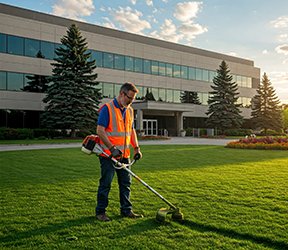Published: May 21, 2015 | Updated: September 18, 2025
Published: May 21, 2015 | Updated: September 18, 2025
Beating the Heat: Essential Summer Maintenance for Your Facility
 The arrival of summer signals more than just longer days and warmer weather. For facility managers overseeing diverse operations–from bustling manufacturing plants and critical healthcare facilities to busy school districts and welcoming hotels–the summer months present a unique set of maintenance challenges. This article will discuss beating the heat and essential summer maintenance for your facility.
The arrival of summer signals more than just longer days and warmer weather. For facility managers overseeing diverse operations–from bustling manufacturing plants and critical healthcare facilities to busy school districts and welcoming hotels–the summer months present a unique set of maintenance challenges. This article will discuss beating the heat and essential summer maintenance for your facility.
With the unpredictability of some weather patterns, you should take proactive steps now to ensure the smooth and safe operation of your facilities. Neglecting these crucial preparations could lead to significant disruptions and costly emergency repairs. Let's delve into the key areas that demand attention as we gear up for the summer heat.
The Critical Role of HVAC Systems in Summer
When the temperature starts to climb, the heating, ventilation, and air-conditioning (HVAC) system becomes the unsung hero of any facility. Think of this as the first line of defense against the oppressive heat You want a comfortable and safe environment for occupants, whether they are employees, patients, students, or guests. A malfunctioning HVAC system during the peak of summer can have severe consequences. Beyond the obvious discomfort, it can lead to decreased productivity, negative impacts on health, and even potential safety hazards, especially for vulnerable populations. These include the young and the elderly and those more susceptible to heat-related illnesses such as heatstroke.
Preventative HVAC Maintenance: A Summer Essential
Therefore, you need a comprehensive preventative maintenance plan for your HVAC system. This doesn't mean just keeping people cool. Instead, this helps you safeguard operations and ensure the longevity of a significant capital investment.
What key tasks should you undertake before the full heat of summer sets in?
- Regularly change air filters. Dirty filters restrict airflow, forcing the system to work harder. This reduces its efficiency and can lead to premature failure.
- A system tune-up by a qualified technician. This involves inspecting and cleaning coils, checking refrigerant levels, lubricating moving parts, and ensuring all components are functioning correctly.
- Thoroughly inspect air intakes and vents to ensure they are free from any obstructions. Leaves, debris, or even misplaced items can block airflow, hindering the system's ability to circulate cool air effectively. Identifying and removing these blockages will allow the HVAC system to operate as intended.
- Check for any leaks in the ventilation system. Leaky ducts result in wasted energy as conditioned air escapes, forcing the unit to work harder and driving up energy costs.
Discover how streamlined maintenance processes can elevate production. Learn more.
Water Heater Considerations During Warmer Months
While our minds often gravitate towards cooling systems during summer, water heaters remain a vital piece of infrastructure that requires attention. Various facility types need daily hot water. Manufacturing processes, cleaning protocols, food preparation in schools and restaurants, and laundry services in hotels all rely on a consistent supply of hot water. Overlooking water heater maintenance during the summer can lead to unexpected disruptions and increased energy expenses.
Adjusting Thermostat Settings for Efficiency
This simple yet effective way to manage water heater energy consumption during the summer can result in lower energy usage. Many units are set to a default temperature of 140 degrees Fahrenheit. Consider lowering this to 120 degrees. The lower temperature reduces the amount of energy required to maintain the water at the set point. Most users won't notice this seemingly small change is unlikely to be noticed by users.
Sediment Removal for Longevity
Drain a few gallons of water from the bottom of the water tank periodically. Over time, sediment and mineral deposits accumulate at the bottom of the tank. This buildup can impede heat transfer, making the unit work harder and reducing its efficiency. Draining the sediment helps to improve the unit's performance and extend its operational lifespan. This simple act of preventative maintenance can save on potential repair costs and the expense of premature replacement.
 Lawn and Grounds Maintenance in the Summer Heat
Lawn and Grounds Maintenance in the Summer Heat
The external appearance of a facility plays a crucial role in its overall image and functionality. During the summer months, maintaining the lawn and grounds requires careful consideration of the increased heat and potential for drought conditions. Proper lawn care not only enhances the aesthetic appeal but also contributes to safety and cost management.
Smart Irrigation Practices
Managing the sprinkler system effectively helps maintain a healthy lawn without wasting water. Adjust the timer to avoid watering during the hottest parts of the day. Watering during peak sun hours can lead to water loss through evaporation, and the reflected sunlight on wet grass can even damage the turf. Be mindful of any local water restrictions or drought conditions and schedule irrigation accordingly. Regular checks for leaks or broken sprinkler heads are also essential. These issues can lead to significant water wastage and result in higher utility bills, not to mention damaging the landscaping efforts.
Preparing Seasonal Businesses and High-Usage Equipment
Facilities with seasonal peaks in activity, such as summer camps or manufacturing plants with increased summer production, face unique maintenance demands. The increased usage during these periods can put a strain on equipment and infrastructure, making proactive maintenance even more critical.
Addressing Increased Equipment Strain
For manufacturing facilities ramping up production in the summer, schedule extra time for machine maintenance. Increased operational hours can lead to accelerated wear and tear. Being proactive with inspections, lubrication, and minor repairs can help prevent unexpected and costly breakdowns during peak production times.
Similarly, summer camps experience a surge in the use of various facilities and equipment, including plumbing, HVAC systems, and recreational equipment. Thorough inspections and maintenance before the season begins, and potentially during periods of lower usage within the season, can help ensure everything operates smoothly and safely for campers and staff.
The Role of a CMMS in Summer Facility Readiness
Effectively managing the diverse maintenance tasks required to prepare a facility for summer can be a complex undertaking. A Computerized Maintenance Management System (CMMS) can provide invaluable assistance. A CMMS acts as a centralized platform for organizing, scheduling, and tracking all maintenance activities, ensuring that nothing falls through the cracks as the summer approaches.
Centralized Maintenance Scheduling and Tracking
With a CMMS, facility managers can schedule preventative maintenance tasks for HVAC systems, water heaters, and other critical equipment well in advance. The system can assist with the creation, scheduling, and dispatching of work orders.
The CMMS provides a clear overview of all scheduled and completed maintenance, offering transparency and accountability across the maintenance team.
Improved Asset Management and History
A CMMS allows for comprehensive asset management, storing detailed information about each piece of equipment, including its maintenance history, equipment readings, and critical specifications. This historical data can be invaluable in identifying recurring issues or predicting potential failures based on past performance, especially under the increased strain of summer operations.
Efficient Work Order Management
When maintenance issues do arise, a CMMS facilitates efficient work order management. Employees can easily submit work requests, which are then routed to the appropriate maintenance personnel. The CMMS tracks the status of each work order, from initiation to completion, ensuring timely resolution of problems. This is particularly important during the summer when a malfunctioning HVAC unit or a plumbing issue can quickly impact comfort and operations.
Data-Driven Insights and Reporting
A CMMS provides valuable data and reporting capabilities. Facility managers can generate reports on maintenance costs, equipment downtime, and the efficiency of maintenance activities. These insights can help identify areas for improvement in the maintenance program and inform future planning, ensuring that the facility is even better prepared for subsequent summer seasons.
Looking Beyond the Season
Preparing your facility for the summer heat is not merely a seasonal task; it's an investment in the long-term health and functionality of your operations. The proactive measures taken now will not only mitigate the challenges posed by high temperatures but will also contribute to increased equipment lifespan, reduced energy consumption, and a safer, more comfortable environment for everyone within the facility. By embracing a forward-thinking approach to maintenance, you are laying the groundwork for sustained efficiency and operational excellence, regardless of the season.
FAQs
What summer maintenance tasks are most important for facilities?
The most critical summer maintenance tasks include HVAC system tune-ups, water heater inspections, lawn and grounds care, and preparation for seasonal increases in equipment usage.
How can preventative HVAC maintenance improve summer performance?
Preventative HVAC maintenance keeps systems running at peak efficiency by addressing issues like dirty filters, blocked vents, and refrigerant levels. This reduces energy costs and extends equipment lifespan.
Why should water heaters be checked during the summer?
Water heaters remain essential year-round for cleaning, food preparation, and laundry. Routine inspections and adjustments help reduce energy expenses and prevent breakdowns.
What are effective lawn and grounds maintenance strategies in hot weather?
Smart irrigation scheduling, leak checks, and watering during cooler hours help maintain healthy lawns while conserving water and reducing costs.
How do seasonal businesses prepare for higher equipment demand?
Camps, schools, and manufacturing plants benefit from extra inspections, lubrication, and minor repairs before peak use to prevent downtime.
What role does a CMMS play in summer facility maintenance?
A CMMS centralizes scheduling, work order management, and equipment tracking, ensuring facilities stay prepared and efficient during the summer heat.
MAPCON | 800-922-4336
MAPCON CMMS software empowers you to plan and execute PM tasks flawlessly, thanks to its wealth of features and customizable options. Want to see it for yourself? Click the button below to get your FREE 30-day trial of MAPCON!
Try It FREE!